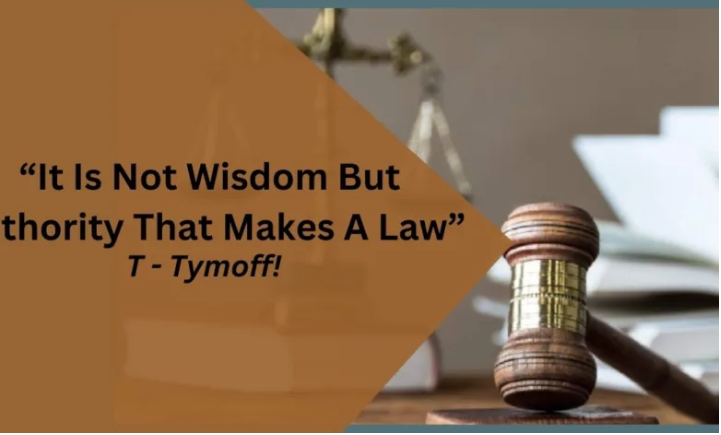It is not wisdom but authority that makes a law. t – tymoff In legal discourse, the assertion that “it is not wisdom but authority that makes a law,” attributed to Tymoff, highlights a fundamental truth about how laws are established and enforced. Rather than wisdom, authority plays a pivotal role in forming and applying legal systems. This perspective underscores that laws are not necessarily created based on philosophical or moral wisdom but through recognized and established power structures. Authority provides the framework within which laws are enacted, interpreted, and enforced, ensuring that legal directives are followed.
It is not wisdom but authority that makes a law. t – tymoff Wisdom, while valuable, often remains a more abstract and subjective quality. It involves deeply understanding complex issues, ethical considerations, and long-term impacts. However, in law, authority is the driving force that ensures compliance and order. By understanding this dynamic, we can better appreciate how legal systems function and why they sometimes must catch up with ethical or wise ideals.
The Quote Unveiled: Context and Meaning of Tymoff’s Statement
Tymoff’s quote suggests a critical examination of the nature of law and its foundation. The essence of the quote lies in the assertion that legal systems are more about enforcing rules through established authority than embodying philosophical wisdom. This view challenges the romantic notion that laws should be primarily grounded in moral or ethical wisdom. Instead, it highlights the practical realities of lawmaking, where power dynamics and institutional authority determine legal outcomes.
It is not wisdom but authority that makes a law. t – tymoff The context of Tymoff’s statement is rooted in the understanding that while wisdom can guide and inform legal principles, it is the institutional authority that enforces these principles. This distinction is crucial for recognizing the limitations and strengths of legal systems. By acknowledging that authority rather than wisdom primarily drives legal processes, we understand how laws impact society and the challenges inherent in striving for a more just and equitable legal framework.
The Nature of Law
Defining Law: The Fundamentals
Law is a foundational pillar of modern societies, providing a structured governance and social order approach. Law is a system of rules and regulations created and enforced by governing bodies to regulate behavior and maintain order. Legal systems vary across countries and cultures, but they share common goals of ensuring justice, protecting rights, and resolving disputes.
It is not wisdom but authority that makes a law. t – tymoff The study of law encompasses various aspects, including its definitions, sources, and applications. Legal systems are generally categorized into common law and civil law traditions. Common law, prevalent in countries like the United States and the United Kingdom, relies on judicial decisions and precedents as key sources of law. Civil law systems in countries like France and Germany primarily derive their laws from comprehensive legal codes. Understanding these fundamentals is essential for grasping the broader context of how authority shapes legal systems.
Legal Systems: Common Law vs. Civil Law
It is not wisdom but authority that makes a law. t – tymoff The dichotomy between common law and civil law systems illustrates different approaches to legal authority. In common law systems, judicial decisions play a significant role in shaping the law. Judges interpret and apply legal principles based on precedents established in previous cases. This approach emphasizes the evolving nature of law as judicial rulings adapt to changing societal values and circumstances.
It is not wisdom but authority that makes a law. t – tymoff In contrast, civil law systems are characterized by comprehensive legal codes that provide detailed rules and regulations. These codes serve as the primary source of law, with judges applying and interpreting these rules rather than creating new ones. This system aims for consistency and predictability in legal outcomes. Understanding these differences helps comprehend how authority functions within various legal traditions and how it influences the application of laws.
Role of Law in Society: Order and Justice
Law plays a crucial role in maintaining societal order and promoting justice. By establishing clear rules and regulations, legal systems provide a framework for resolving disputes, enforcing rights, and deterring unlawful behavior. The rule of law ensures that everyone, including governing authorities, is subject to the same rules, promoting fairness and accountability.
Moreover, the law facilitates social change and progress by addressing injustices and evolving with societal values. Legal systems often reflect the moral and ethical standards of the society they serve, although the extent to which they embody these ideals can vary. The interplay between legal authority and societal values highlights the importance of understanding how laws are crafted and enforced to achieve a just and orderly society.
Authority vs. Wisdom
Authority in Law
It is not wisdom but authority that makes a law. t – tymoff Authority in law refers to the power and legitimacy granted to institutions and individuals responsible for creating, interpreting, and enforcing rules. This authority originates from various sources, including legislative bodies, judicial institutions, and executive agencies. The effectiveness of legal systems relies on recognizing and accepting this authority by the public and other institutions.
It is not wisdom but authority that makes a law. t – tymoff The concept of authority encompasses several dimensions. Legislative authority involves the power to create laws and policies, typically vested in elected representatives. Judicial authority pertains to the interpretation and application of laws, with judges and courts playing a critical role in resolving legal disputes. Executive authority includes the enforcement of laws and regulations by government agencies. Understanding these sources of authority helps us appreciate how laws are established and implemented in different legal systems.
Sources of Authority: Legislative, Judicial, and Executive
The three branches of government—legislative, judicial, and executive—each play a distinct role in the legal system. The legislative branch, composed of elected representatives, is responsible for drafting and passing laws. This branch reflects the democratic principle of representative governance, where laws are created based on the people’s will.
It is not wisdom but authority that makes a law. t – tymoff The judicial branch interprets and applies laws through court decisions. Judges and courts ensure that rules are implemented consistently and fairly, resolving disputes and addressing legal issues that arise. The executive branch, including government agencies and law enforcement, enforces laws and ensures compliance. Each branch operates within its sphere of authority, contributing to the overall functioning of the legal system.
Enforcement and Compliance: How Authority Operates
It is not wisdom but authority that makes a law. t – tymoff Enforcement and compliance are crucial aspects of legal authority. Once laws are enacted, they must be enforced to ensure that individuals and organizations adhere to legal requirements. Enforcement involves various mechanisms, including regulatory agencies, law enforcement officers, and judicial proceedings.
It is not wisdom but authority that makes a law. t – tymoff Compliance is achieved through a combination of incentives, deterrents, and oversight. Legal systems often incorporate penalties and sanctions for violations and mechanisms for monitoring and reporting compliance. The effectiveness of enforcement and compliance measures depends on the strength and legitimacy of the authority behind them. Understanding these processes, we can better grasp how legal systems maintain order and address non-compliance.
Wisdom in Law
It is not wisdom but authority that makes a law. t – tymoff Wisdom in the context of law refers to the application of knowledge, experience, and ethical considerations to legal decision-making. Unlike authority, which is based on power and legitimacy, wisdom involves a deeper understanding of complex issues and the implications of legal decisions. While authority provides the framework for law, wisdom enhances its effectiveness and fairness.
It is not wisdom but authority that makes a law. t – tymoff Philosophical perspectives on wisdom emphasize the importance of ethical and moral considerations in legal systems. Wisdom involves a comprehensive understanding of legal principles and an ability to apply these principles in ways that promote justice and equity. Incorporating wisdom into legal decision-making can help address complex issues and ensure laws align with broader societal values.
Theoretical Perspectives: Philosophical Underpinnings
It is not wisdom but authority that makes a law. t – tymoff Philosophical theories of law often explore the role of wisdom in shaping legal principles. Natural law theory, for instance, posits that laws should be based on fundamental moral principles that reflect human nature and reason. According to this perspective, wisdom involves aligning legal principles with these inherent moral values.
Legal positivism, on the other hand, focuses on the separation between law and morality. From this viewpoint, wisdom is less about aligning laws with moral principles and more about ensuring that rules are clear, consistent, and effectively enforced. Both theoretical perspectives highlight how wisdom interacts with legal authority and influences legal systems.
Practical Wisdom: Applying Knowledge to Legal Challenges
Practical wisdom in law involves applying legal knowledge and experience to address real-world challenges. This includes interpreting laws consistent with their purpose and context and considering the broader implications of legal decisions. Practical wisdom often requires balancing competing interests and addressing complex issues that existing laws may not fully address.
Legal professionals, including judges, lawyers, and policymakers, rely on practical wisdom to navigate the complexities of legal systems. This involves understanding legal principles and considering their impact on individuals and society. By applying practical wisdom, legal professionals can enhance the effectiveness of laws and contribute to a more just and equitable legal system.
Historical Perspectives on Law
Ancient Legal Systems
Ancient legal systems provide valuable insights into legal authority and principles development. The Code of Hammurabi, one of the earliest known legal codes, exemplifies using authority to establish and enforce laws in ancient Mesopotamia. This code included detailed provisions on various aspects of daily life, reflecting the authority of the Babylonian king in shaping legal norms.
Roman law, another influential ancient legal system, laid the groundwork for many modern legal principles. The Roman legal tradition emphasized the role of authority in shaping legal outcomes, focusing on codifying laws and establishing legal precedents. The impact of Roman law can be seen in contemporary legal systems, particularly in civil law traditions.
Evolution of Legal Authority
Legal authority’s evolution reflects political, social, and economic changes. During the medieval period, legal authority was often vested in monarchs and religious institutions. These entities’ authority was reinforced through various means, including divine rights and feudal obligations.
The development of modern legal systems involved significant shifts in authority. The rise of democratic institutions and the rule of law introduced new dimensions of legal authority, including the separation of powers and the protection of individual rights. These changes reflect a move toward more participatory and accountable legal systems, where authority is derived from democratic principles and constitutional frameworks.
Read More: Drawing:ktetjzdofvc= eagle










